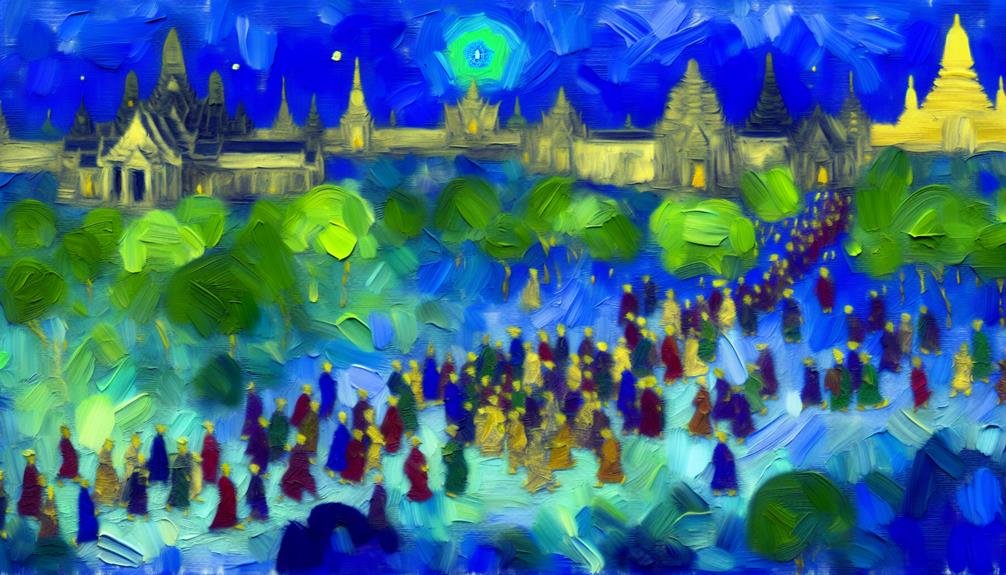A theocracy fuses religious doctrine with governance, allowing religious leaders to wield political power. Pros include alignment between laws and religious principles, promoting societal cohesion, and providing a clear moral foundation. This unification can lead to efficient decision-making and continuity in governance. However, the cons are significant. Theocracy may restrict personal freedoms, limit political diversity, and promote human rights violations. It can lead to discrimination against minorities and stifle scientific progress. Without separation of church and state, the risk of power abuse is high. Learning more about this governance type reveals deeper implications for society.
Takeaways
- Theocracy ensures laws and policies are grounded in religious doctrines, providing a clear moral framework.
- It promotes societal cohesion and unity through shared religious beliefs and values.
- Theocracy can restrict personal freedoms and individual liberties, limiting diversity of thought.
- Strict religious laws may lead to human rights violations, especially for marginalized groups.
- Lack of separation between religion and state can result in power abuse and hinder scientific progress.
Definition of Theocracy
Theocracy is a form of government in which religious leaders wield ultimate authority, and political decisions are guided by principles of a specific religion. This form of government intricately intertwines the legal system and governance structures with religious beliefs, ensuring that the foundation of political power is heavily rooted in religious principles. In a theocracy, the power to govern is vested in religious authorities, who are often seen as the ultimate interpreters of the divine will. Consequently, the laws and policies enacted under this system are designed to align with the tenets and doctrines of the prevailing religion.
The synergy between spirituality and politics in a theocracy means that religious doctrines directly influence governmental decisions. This creates a unique framework where the moral and ethical standards of the religion become the benchmark for the legal and political landscape. Therefore, the decisions made by those in power are not only political but also spiritual, aiming to reflect the perceived divine guidance.
The overarching influence of religious principles in this form of government shapes every aspect of public and private life, aiming to create a society that mirrors the religious ideals it upholds.
Historical Examples

How have historical civilizations demonstrated theocratic principles in their governance structures? Historical examples abound, showcasing the integration of religion and governance.
In ancient Egypt, pharaohs were considered divine entities, both political leaders and gods. This theocratic structure centralized religious and state authority in one figure, ensuring political stability and social cohesion.
Similarly, ancient Israel provides another compelling example. The united tribes under a theocratic monarchy believed their king sat on God’s throne, a clear intertwining of divine and political power. This system allowed religious laws to govern everyday life, shaping the societal framework.
Imperial Japan’s historical governance also exhibited theocratic elements. The emperor was regarded as a divine descendant, reinforcing the fusion of spiritual and temporal authority. This divine status bolstered the emperor’s legitimacy and unified the nation under a shared religious identity.
Ancient China incorporated religious beliefs into its governance, particularly through the Mandate of Heaven. This concept asserted that the emperor was chosen by divine forces, linking political authority with celestial approval.
The Roman Empire, although primarily known for its political prowess, intertwined religious authority with state power. The emperor often held religious titles, underscoring the theocratic dimensions in governance.
These historical examples illustrate the enduring influence of theocratic principles in shaping societies.
Modern Instances
Modern instances of theocracy, such as Iran, Saudi Arabia, and Vatican City, offer varied insights into how religious authority influences governance. These states provide a lens through which to examine the intersection of religion and politics, as well as the societal impacts resulting from theocratic rule.
Understanding these contemporary examples is essential for evaluating the advantages and disadvantages inherent in theocratic systems.
Contemporary Theocratic States
Iran, Saudi Arabia, Afghanistan under Taliban rule, and Vatican City serve as prominent examples of contemporary theocratic states where governance is deeply interconnected with religious doctrines.
In Iran, the Supreme Leader holds significant political power, guiding the nation based on Islamic law. This system merges religious authority with state governance, aiming to create a society rooted in Islamic values. However, this intertwining often raises concerns regarding human rights, as the strict application of religious laws can conflict with international human rights standards.
Saudi Arabia operates as a theocratic monarchy where Islamic law is the foundation of its legal and political systems. The monarchy’s governance is deeply influenced by religious principles, promoting a unified religious and political identity. Nevertheless, the rigid interpretation of these laws has been criticized for limiting freedoms and human rights, particularly those of women and minorities.
Afghanistan under Taliban rule represents another instance of a modern theocratic state with an uncompromising adherence to Islamic laws. The Taliban’s governance model emphasizes religious unity but has faced significant global scrutiny for its human rights record.
Governance and Religion
The governance structures of contemporary theocratic states like Iran and Afghanistan are characterized by the substantial political power held by religious leaders, deriving authority directly from religious texts and principles. In these theocratic governments, the intertwining of religious beliefs and political power is profound, with religious leaders often ruling in the name of their interpretation of holy books. This blend of governance and religion leads to a legal and political framework heavily influenced by the dominant religion’s moral and ethical guidelines.
In Iran, for example, the Supreme Leader holds ultimate authority and is seen as the highest interpreter of Islamic law, greatly shaping national policies and laws. Similarly, Afghanistan’s governance under the Taliban reflects a strict adherence to their interpretation of Islamic texts, with little separation between church and state.
Theocratic governments prioritize the dominant religion’s doctrines, often leading to challenges in accommodating diverse religious beliefs and political pluralism. The lack of separation between church and state in these systems can result in policies that might conflict with international human rights standards.
Therefore, modern instances of theocratic governance present a unique intersection of religious leadership and political authority, deeply rooted in religious texts and principles.
Societal Impacts Observed
The profound intertwining of religion and governance in modern theocratic states has significant societal impacts, such as the strict enforcement of religious laws and the curtailment of personal freedoms. In countries like Iran, the societal landscape is shaped by rigid adherence to religious edicts, resulting in limitations on personal freedoms and harsh penalties for non-compliance. Similarly, Saudi Arabia enforces gender segregation and restrictions on public behavior, often accompanied by extensive censorship.
Afghanistan under the Taliban exemplifies extreme societal impacts, where harsh penalties and limited rights for women are entrenched in theocratic rule. The regime’s strict enforcement of religious laws severely restricts individual liberties. North Korea, while not a traditional theocracy, exhibits state-enforced ideology that mimics theocratic control, limiting information and religious expression.
Vatican City, governed by Catholic doctrines, influences society through moral teachings and the primacy of the Pope, although its impact is less coercive compared to other theocracies. The table below highlights key societal impacts observed in these modern instances.
| Country | Societal Impact |
|---|---|
| Iran | Strict enforcement of religious laws, harsh penalties |
| Saudi Arabia | Gender segregation, restrictions on public behavior, censorship |
| Afghanistan | Harsh penalties, limited rights for women, strict religious adherence |
These modern examples illustrate the varied yet profound societal impacts of theocracy.
Key Characteristics

A theocracy is characterized by a central religious authority where leaders govern based on religious doctrine.
This structure guarantees that legal and moral codes are derived directly from sacred texts, aligning societal regulations with religious principles.
Such integration creates a governance model where spiritual and political spheres are deeply interconnected.
Central Religious Authority
Centralizing religious authority in governance, theocracy integrates spiritual leaders and religious texts into the core decision-making processes. This structure operates under the premise of divine authority, where the guidance of a higher power is believed to influence governance directly. Consequently, religious leaders, often seen as intermediaries of divine will, play a pivotal role in shaping and enforcing policies.
In a theocratic system, the traditional separation between church and state is minimal or entirely absent. This intertwining results in laws and policies that are deeply rooted in religious principles. The societal moral framework in these nations is upheld and reinforced through the teachings and doctrines of the predominant religion. The assumption is that aligning governance with divine authority ensures moral and just leadership.
The centralization of religious authority guarantees uniformity in the interpretation and application of religious texts, potentially minimizing legal ambiguities. However, this lack of separation can also lead to challenges, particularly in pluralistic societies where diverse beliefs coexist. Balancing religious homogeneity with the need for inclusivity becomes a critical issue, reflecting the core dynamics and implications of central religious authority in a theocratic governance model.
Legal and Moral Codes
Integrating legal and moral codes from sacred texts, a theocratic governance model enforces laws deeply rooted in religious doctrines. The intertwining of legal systems with religious beliefs guarantees that the legal codes reflect the moral codes prescribed by the divine authority. These religious teachings, derived from sacred texts, provide the foundation for a theocracy’s legal framework. This integration means that laws and policies in a theocracy are not just legal mandates but are also moral imperatives aimed at aligning societal behavior with religious principles.
In a theocratic system, decisions are heavily influenced, if not entirely dictated, by divine authority. This reliance on religious teachings ensures that the moral framework governing the society is consistent with the religion’s values and ethics. However, this lack of secularism, characterized by minimal separation between church and state, can present challenges. The close association between legal and moral codes under theocratic rule often leaves little room for dissenting beliefs or the accommodation of diverse religious views.
While theocratic legal and moral codes offer a cohesive and unified societal framework, they can also lead to rigid governance structures. The absence of secularism may limit individual freedoms and the evolution of laws to address contemporary issues outside the scope of religious teachings.
Advantages

Theocracy provides a clear moral framework for society by basing its laws and governance on established religious principles. This alignment offers several advantages that contribute to the orderly and ethical operation of a state.
- Guarantee Authority: In a theocratic system, the ultimate authority is derived from sacred texts and religious leaders, reducing ambiguity in legal and moral decision-making. This can lead to a more ethical society as laws and policies are grounded in revered, time-tested religious doctrines.
- Foster Social Cohesion: The common religious foundation fosters social cohesion among citizens, promoting unity and a shared sense of purpose. When individuals adhere to the same religious principles, it enhances community bonds and reduces societal conflicts stemming from divergent beliefs.
- Uphold Traditional Values: The continuity and stability provided by upholding traditional values are significant. A theocracy maintains a consistent governance structure that venerates historical customs and practices. This respect for tradition ensures that societal changes are gradual and rooted in a well-understood moral context.
Furthermore, theocratic governance guarantees a unified government agenda, which streamlines decision-making processes and minimizes political fragmentation.
Disadvantages

While the advantages of theocracy highlight its potential for moral consistency and social cohesion, it is equally important to recognize the significant disadvantages inherent in this form of governance. Among the most prominent issues is the limitation on individual freedoms, as theocratic systems often impose strict adherence to religious laws, thereby restricting personal autonomy and expression.
Religious intolerance is another critical concern. Theocracies tend to favor the dominant religion, leading to discrimination against minority religious groups. This exclusion can foster social divisions and conflict. Additionally, the rigid adherence to religious doctrines can severely hinder scientific progress. Scientific and intellectual endeavors may be stifled if they conflict with religious teachings, limiting innovation and advancement.
The lack of separation between religion and state in theocratic governments can also result in an abuse of power. Religious or political leaders may exploit their authority for personal gain or to maintain control, undermining the rule of law.
Furthermore, theocratic systems often suppress political diversity and dissent. This suppression limits democratic participation and representation, as alternative viewpoints and political parties are marginalized or outright banned. Consequently, the absence of a pluralistic political environment can stifle societal growth and development.
Frequently Asked Questions
What Are the Pros of Theocracy?
Theocracy offers religious unity, moral governance, and community cohesion. It emphasizes ethical leadership and spiritual focus, fostering a more just society. Additionally, it aids in cultural preservation by upholding traditional values and beliefs, ensuring stability.
How Does Theocracy Affect Citizens?
Theocracy affects citizens by providing moral governance and promoting social cohesion and cultural uniformity. However, it can lead to limited freedoms, ethical dilemmas, and religious discrimination, particularly towards minority groups, potentially undermining individual rights and diversity.
What Are Two Facts About Theocracy?
Theocracy establishes a system where religious authority and spiritual leadership dominate, with governance grounded in divine laws derived from sacred texts. This form of ecclesiastical governance guarantees that faith-based rules permeate all aspects of political decision-making.
What Rights Are Guaranteed in a Theocracy?
In a theocracy, rights guaranteed often include religious freedom for adherents of the state religion, worship practices aligned with sacred texts, and legal enforcement by clergy influence, grounded in moral authority derived from religious doctrine.
Conclusion
Theocracy, as a system of governance where religious leaders control political power, presents a unique blend of advantages and disadvantages.
While it may guarantee moral governance and unified societal values, it often suppresses dissent and limits individual freedoms.
Historical and modern examples illustrate diverse outcomes, contingent on specific contexts.
Ultimately, theocratic governance’s success or failure hinges on the alignment between religious doctrines and the populace’s evolving needs and values.

